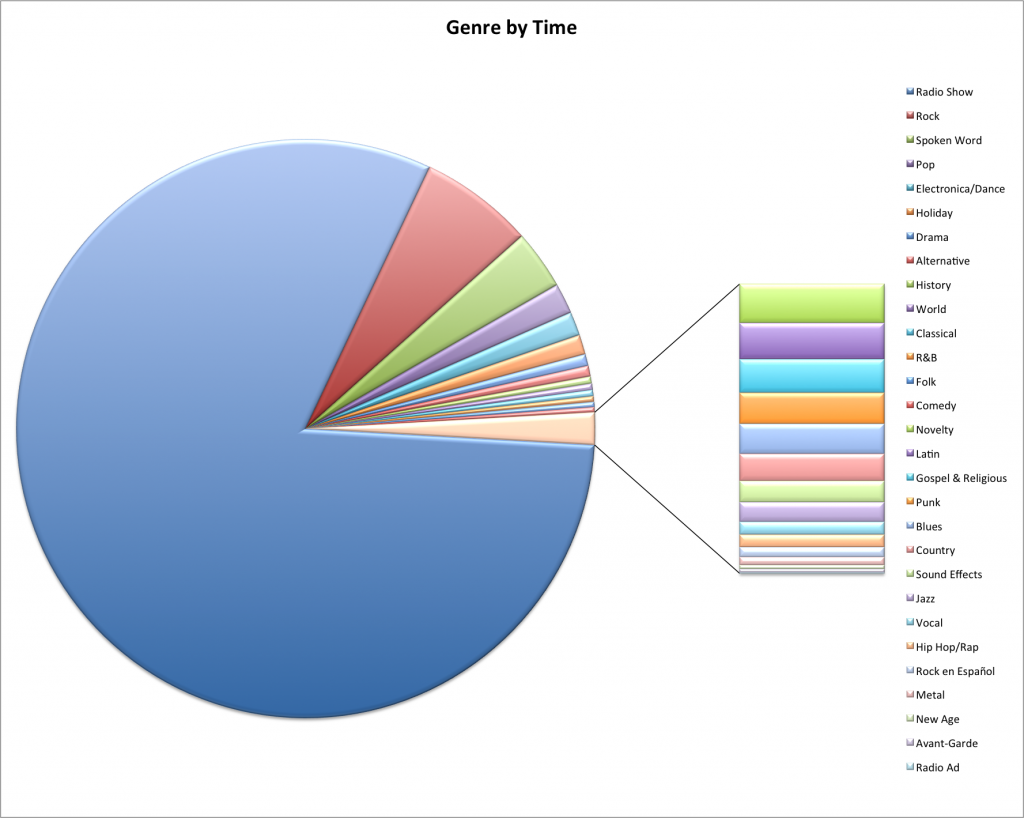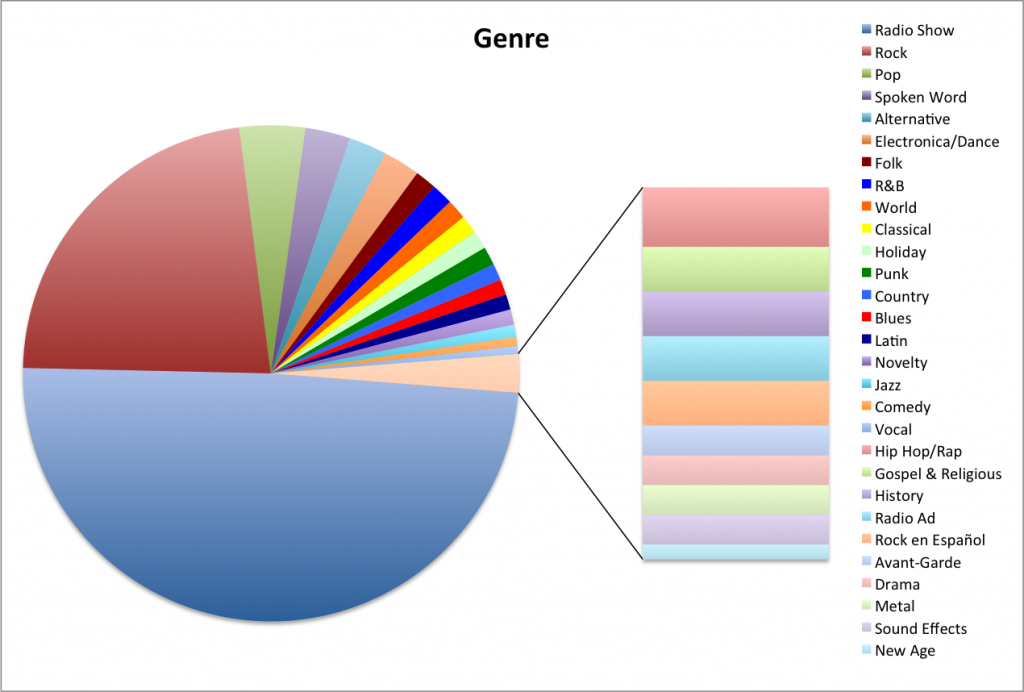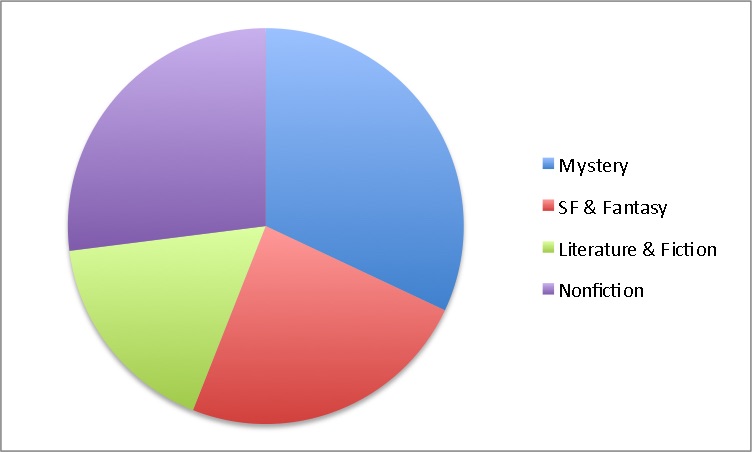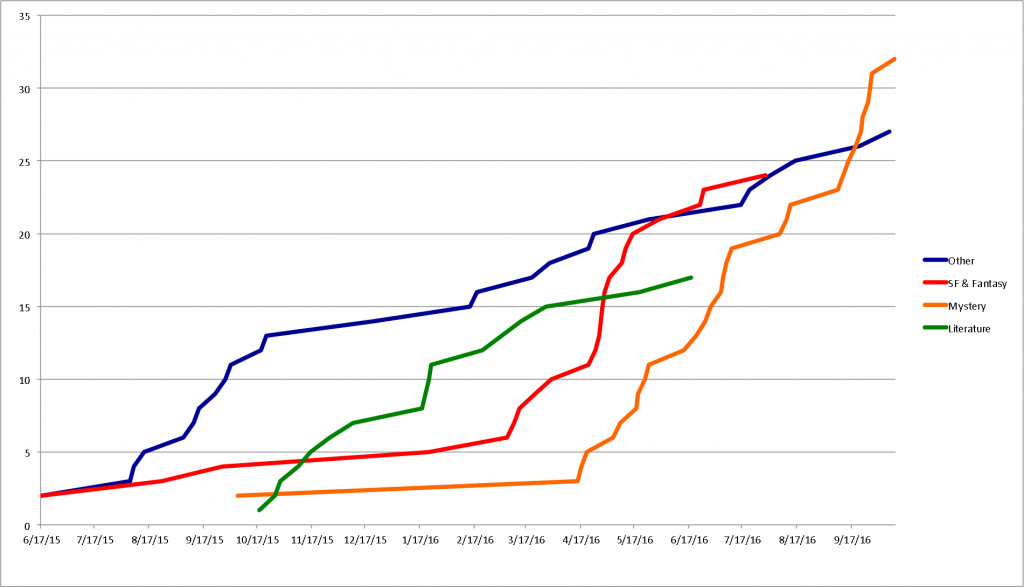As promised, though belated, herewith are some points derived from data pursuant to the tranche of the most recent 1,000 songs which brought my total of iTunes tracks listened to up to the 99,000 mark. In the contemporary thought space, one calls such points and the thoughts about them ‘insights’, which pleads a special power for these details. One can do so much with modern computing power.
Purview
These details concern merely the 1,000 tracks played by iTunes (or its related phone app) from the 10th of December, 2016 to the 28th of March, 2017 — which tracks comprise numbers 98,001 – 99,000 in my ‘Already Played’ Smart Playlist. This playlist has the following very simple rule: # of Plays is greater than zero; the rule is applied to All Media.
This very basic rule means that movies or TV shows watched through the Apple media apparatus are counted as a ‘played track’, as we shall see in the 1k tranche of tracks. It also has as a concomitant consequence the fact that I shall never achieve 100% ‘completion’ in playing my entire collection, this due to the fact that PDF files included as ‘Digital Booklets’ with Apple Music purchases are not — cannot be, in fact — ‘played’ according to the logic provided for by the database.
Two other factors mar the mapping of the iTunes data with the ‘true’ reality which it (implies/reflects/purports to reveal/?) mirrors: First, any songs which have been deleted* from my collection lose any associated data as well, so their Plays and other datapoints are removed from the present universe (though I suppose one could trawl through backups to resurrect such). And second, iTunes provides a means by which the Plays may be ‘reset’ back to zero, so there may have been songs which have been listened to but which have since had that fact masked/obliterated/effaced from history.
Side note: This functionality seems to have changed in recent months, in that formerly whilst the Plays were reset to zero, the ‘Last Played’ timestamp remained. Now the latter is removed as well. Thus I have several (13) tracks which have no plays but do have a Last Played date. Oddly also, there are quite a few (131) songs which have been ‘Played’ but which have no associated ‘Last Played’ datum.
*Missing songs still have their associated data, though I’ve tried to replace such files (where possible) or remove the reference (where not). I still have a handful I haven’t been able to rectify, victims of my first iTunes data disaster, the loss of 20 GB of songs due to a hard drive failure oh-so-many years ago.
There is also the problem of duplicate music. I do not in this case mean duplicate occurrences of the same song on the same album — the underlying files are kept cleaner than that. But it is not unusual for popular songs to appear in my collection both on the original album release as well as on (sometimes multiple) compilation albums. There are also cases where iTunes itself has duplicated tracks, with an old ‘Protected’ track being joined by a ‘Purchased’ version. I have also some regular .mp3 versions of old purchased music, and have kept both out of spite, insecurity, and laziness.
In the data which follows, I have made some manual changes/edits, to wit: 1) I have simplified/changed Genres to make aggregation more possible or rational (thus ‘Calypso’ has been changed to ‘Folk’, for example), 2) I have had to edit data at times due to improper handling of exported iTunes information (the song title “Somebody’s Wrong” (with an unfortunate so-called smart quote) was changed to “Somebody’s Wrong” somewhere along the path into Excel, for instance), and 3) some names may have been changed to protect the innocent, if any such there be.
Overview
Due to changes in my material life (please see my LinkedIn page), my listening habits/opportunities/choices are also materially changed. Nowhere is this more apparent than in the primary fact presented by these 1,000 songs: Almost 1/2 (49%) of all tracks played are Radio Shows.
Almost 1/2 (49%) of all tracks played are Radio Shows
As previously mentioned, these tracks were played between December 10, 2016 and March 28, 2017, making a total of 108 days to play these 1,000 songs. Thus an average of 9-and-1/4 songs were played per day.
9.26 Songs played per Day
Assuming that each track was played only once during the thousand song run — not an entirely valid assumption, but a fair hypothesis for this analysis — the total amount of time taken to play these 1k songs was 12 days, 1 hour, 36 minutes, and 49 seconds.
Total Time of Tracks: 12 Days, 1 Hour, 36 Minutes, and 49 Seconds
Since these songs were played over a stretch of 108 days, and given the total length of time of all played tracks above, this means that over 11% of the 108-day period was spent listening to iTunes in one way or another.
11.17% of Each Day spent listening to iTunes
or
2 hours and 41 minutes per day Listening to Stuff
Most of these tracks have only been played once, which is both my preference and delight. Specifically, 833 songs (7/8) were played for the first time during this most recent thousand tracks. The remaining 167 songs with multiple plays together have been played a grand total of 529 times.
833 tracks had never been played before
Details
Genres
The data shows the prevalence of Radio Shows in my recent listening. Here is a chart, broken down by genre, showing what was included in these one thousand tracks:
And here is a table showing those genres which each provided over 1% of the total number of tracks played:
Songs Played by Genre
Radio Show 491 Rock 226 Pop 43 Spoken Word 29 Alternative 25 Electronica/Dance 24 Folk 14 R&B 14 World 13 Classical 12 Holiday 12 Punk 12 Country 11
All the rest of tracks played make up 7.4% of the total.
But the prevalence of Radio Shows is even greater than shown by this first view, due to the fact that (natürlich) the average radio show is longer than most popular songs. If we inspect the tracks played with respect to their duration we discover that the Radio Show genre actually makes up over 80% of the total.
Over 80% of time spent listening to Radio Shows
And of course there’s a chart:

Aaaand a table…
Tracks Played by Genre by Time
Radio Show 81.2% Rock 6.4% Spoken Word 3.3% Pop 1.7% Electronica/Dance 3.3% Holiday 1.1%
(The remainder of tracks make up just over 5% of total time.)
Due — primarily, but not exclusively, as we shall see — to the preponderance of old radio shows among the one thousand tracks under consideration, the average length of the played tracks was seventeen minutes and twenty-two seconds.
Average length of played tracks: 17:22.6
Radio shows were not the longest tracks, on average, due to the fact that TV shows are included in the 1,000 files under consideration. We watched a couple of episodes of Shetland during this period, which averaged fifty-eight minutes (and one second) in length. The average length of radio shows was second, however, coming in at twenty-eight minutes and 43.5 seconds. Indeed, there were quite a few genres which had very long average lengths — again, due to changed material conditions of the listener. Five other genres had average times of over ten minutes. Even if we limit our attention to only those genres contributing at least 1% of the total number of tracks we see that the average length of songs played seems inordinately long, far greater than Pete Townshend’s two minutes and thirty-seven seconds at which he claimed all rock songs aimed before the advent of The Who. Here’s another table:
Average Length of Tracks by Genre
(with more than 10 tracks played)
Radio Show* (491 tracks) 28:43.5 Spoken Word* (29 tracks) 19:49.7 Holiday* (12 tracks) 16:00.6 Electronica/Dance* (24 tracks) 9:34.8 Pop* (43 tracks) 6:50.4 Classical (12 tracks) 5:07.1 World (13 tracks) 4:58.5 Rock* (226 tracks) 4:53.8 Novelty (10 tracks) 4:10.9 Alternative (25 tracks) 4:08.2 Latin (10 tracks) 3:53.3 R&B (14 tracks) 3:43.3 Folk (14 tracks) 3:41.4 Blues (10 tracks) 3:13.2 Punk (12 tracks) 2:44.3 Country (11 tracks) 2:39
(*These categories also contributed over 1% of the total time played.)
The shortest time per track was the minuscule 17 seconds averaged across the three tracks in the Radio Ad category, far smaller than the next shortest average of 1:53 for the Avant-Garde genre (which latter is so small due to the 31 seconds Marie Osmond took to perform Hugo Ball’s Dada poem “Karawane” in an mp3 provided by Greil Marcus to accompany his fantastic book Lipstick Traces).
Albums
With the prevalence of radio among these 1,000 tracks, it may seem strange to speak of ‘songs’ or ‘albums’, but I have organized those tracks just as if they were long albums with lots and lots of long ‘songs’. Some are stored as compilations — such as the Lux Radio Theater which had different stars each week — and some are associated with a single artist — such as Jack Webb’s Dragnet radio series. There are also those shows which had different stars over the length of their radio run, such as The Adventures of Philip Marlowe, which had seen its best days with Gerald Mohr as the iconic detective by the time Van Heflin took over the eponymous role.
433 tracks came from just 14 albums
Ignoring multiple artists/actors, just fourteen ‘albums’ as I define them account for over 40% of the songs played in the selection under review. Each of these contributed ten or more tracks to the total 1,000. These albums are as follows:
| The 1966 Live Recordings (36 CD set) | Bob Dylan | 117 tracks |
| Dragnet | Jack Webb | 78 |
| Yours Truly, Johnny Dollar | Bob Bailey et al. | 31 |
| Boston Blackie | Richard Kollmar et al. | 30 |
| Box 13 | Alan Ladd | 29 |
| The Adventures of Philip Marlowe | Gerald Mohr et al. | 29 |
| Let George Do It | Bob Bailey | 28 |
| The Adventures Of Frank Race | Tom Collins & Ivan Dubov | 18 |
| Richard Diamond, Private Detective | Dick Powell | 15 |
| Nick Carter, Master Detective | Lon Clark | 13 |
| The Adventures Of Sam Spade | Howard Duff (& Steve Dunne) | 12 |
| The Casebook Of Gregory Hood | Gale Gordon & Elliot Lewis | 12 |
| The Shadow | Orson Welles et al. | 11 |
| Under The Red Sky | Bob Dylan | 10 |
Artists
Besides the artists mentioned above, only four other artists appear more than ten times in the 1k list. These are Steely Dan (16 tracks), Charles Russell (the 1st Johnny Dollar, also with 16 tracks), Anson Weeks (14 tracks), and Special Ed (a nom de radio for a WFMU DJ whose Christmas specials were in rotation last winter, with 11 tracks).
The perennial favorite (with me) Bob Dylan sang out most frequently, with 145 songs out of The 1000. 264 artists only appeared one time during this set of songs.
Most played artist: Bob Dylan (145 tracks)
Songs
As I said earlier, the vast majority — 833 — of the played songs have only been heard once (by me). Of the 167 songs whose total plays make up the 529 plays mentioned above, the most frequently heard was the delightful duet by William Shatner and Henry Rollins, “I Can’t Get Behind That”, from Shatner’s incredible album Has Been, which I’ve listened to (according to iTunes data) a total of twenty-one times.
Most played song (21 times): “I Can’t Get Behind That” by William Shatner
The most frequently played songs in this set of 1,000 are as follows:
Songs With Most Plays
(played at least 10 times)
“I Can’t Get Behind That” William Shatner 21 plays “Without God” The Word 19 “Brothers In Arms” Dire Straits 15 “Black Betty” Ram Jam 14 “Go” Dusminguet 14 “Smells Like Teen Spirit” Nirvana 14 “Dock of the Bay” Otis Redding 10 “I Won’t Back Down” Johnny Cash 10
There was a lot of variance in track length from the average of 17 minutes and 23 seconds referenced above. The shortest track was only 4 seconds long, an audio clip from the Dragnet radio show where Jack Webb speaks of “Crime, the ally of treason”. The longest track clocked in at one hour, twenty-seven minutes and twenty-nine seconds; this was the “The Kranesburg Matter”, originally aired over five days in 1956 (August 24th to 30th) as part of the radio show Yours Truly, Johnny Dollar, starring (in this particular incarnation) Bob Bailey as the insurance investigator with the gold-plated expense account. The song closest to the average length (the median) was a recording of the intermission from Bob Dylan’s Australia concert in Sydney on April 13, 1966, which clocks in at seventeen minutes and twenty-eight seconds.
Tracks Played By Length
Shortest “Crime, the ally of treason” Jack Webb 0:04 Longest “The Kranesburg Matter” Bob Bailey 1:27:29 Median intermission (Bob Dylan) 17:28
Review
“The unexamined life is not worth living.”
— Socrates
So we have learned … What, exactly? I listened to a lot of old radio. One out of every nine minutes I was playing iTunes. That’s about it, maybe. Perhaps a better analyst would make more of this data.
I also know that it took me quite some time to fulfill my promise to provide this data analysis. As mentioned above, the Thousandth track in this set was listened to all the way back at the end of March, on Day 68 of the New Era. Much of this is due to procrastination; who in their right mind truly enjoys scrubbing data errors in Excel? But a large part of the delay may be laid at the feet of my changed material conditions. Less time than previously was available to me, and an exhaustion was felt beyond thud weight of imperious data.
In any event, it is good to finish this analysis, for two reasons. First, avoiding the despair of analysis interminable is always good; endings are better than the crushing wait for messiahs who never arrive. Secondly, the time since the 99,000th track was heard have not been soundless. More tunes/tracks/songs/stuff have passed through iTunes in the interim, and we are fast approaching yet another (base-10) milestone. Indeed, I am only 55 tracks away from my 100,000th iTunes track played, and I am glad to have finished with the last 1000 after only 945 more tracks were heard. More to come.
In my One Hundred Books review, I provided a list of the entire dataset under consideration. With one thousand audio files, however, perhaps this might seem overkill. To avoid boring you too much more, i will heap up only 1/10th of the complete dataset. Here it is:
One-Tenth of One Thousand Tracks
| # | Artist | Name | Album | Year | Time | Genre |
| 10 | Bob Dylan | “Tom Turkey” (1) | Pecos Blues: Pat Garret & Billy The Kid Outtakes | 1973 | 3:55 | Rock |
| 20 | Zeki Müren | “Sûznâk Aksak Şarkı” | 1955-63 Kayıtlaı/Recordings | 3:38 | World | |
| 30 | Jack Webb | “The Big Ham” (06/28/53) | Dragnet Radio Series | 1953 | 29:21 | Radio Show |
| 40 | Lulu | “Feelin’ Alright” | What It Is! Funky Soul And Rare Grooves: 1967-1977 | 1970 | 3:02 | R&B |
| 50 | Jack Webb | “The Big Child” (04/26/55) | Dragnet Radio Series | 1955 | 25:22 | Radio Show |
| 60 | Herb Alpert & The Tijuana Brass | “The Big Cowboys And Indians Fight At Casino Royale; Casino Royale Theme” | Casino Royale [Australian Mono] | 1967 | 4:49 | Pop |
| 70 | Yo La Tengo | “Big Day Coming” | Painful | 1993 | 7:05 | Alternative |
| 80 | Jack Webb | “The Big Fake” (06/01/50) | Dragnet Radio Series | 1950 | 29:30 | Radio Show |
| 90 | Bruce Springsteen | “Downbound Train” | Born In The U.S.A. | 1984 | 3:37 | Rock |
| 100 | Bob Bailey | “The First Client” (05/14/46) | Let George Do It | 1946 | 29:19 | Radio Show |
| 110 | James Kibbie | “Duetto III” BWV804 | Bach Organ Works – Clavierübung III | 2:48 | Classical | |
| 120 | Muddy Waters | “Double Trouble (Alternate)” | Chess Blues 1954-1960 | 1992 | 3:31 | Blues |
| 130 | Johnny Cash | “Ballad Of Ira Hayes” | Classic Cash | 1988 | 2:53 | Country |
| 140 | Blue Cheer | “The Hunter” | Vincebus Eruptum / Outsideinside | 4:31 | Rock | |
| 150 | Jethro Tull | “A Small Cigar” | Nightcap: Unreleased & Rare Tracks | 1993 | 3:39 | Rock |
| 160 | Marie Osmond | “Karawane” | Lipstick Traces | 1984 | 0:31 | Avant-Garde |
| 170 | Heiko Laux | “Organism” | Liquidism | 1998 | 6:26 | Electronica/Dance |
| 180 | Alicia Keys | “Girlfriend” | Songs In A Minor | 2001 | 3:34 | R&B |
| 190 | Anson Weeks | “1. Hallelujah 2. It Was So Beautiful 3. The Lady I Love 4. I Guess I’ll Have To Change My Plan” | Anson Weeks Broadcast | 13:05 | Pop | |
| 200 | Bob Dylan | “Desolation Row” | The 1966 Live Recordings 1966-02-05 – Westchester County Center, White Plains, NY [AUD] | 1966 | 10:50 | Rock |
| 210 | Bob Dylan | “Love Minus Zero/No Limit” [incomplete] | The 1966 Live Recordings 1966-02-06 – Syria Mosque, Pittsburgh, PA [AUD] | 1966 | 3:53 | Rock |
| 220 | artist | Track 01 | album | 1:36 | Spoken Word | |
| 230 | Bob Dylan | “Tell Me, Momma” | The 1966 Live Recordings 1966-02-26 – Island Garden, Hempstead, NY [AUD] | 1966 | 3:42 | Rock |
| 240 | Anson Weeks | “Compilation of Selections 1” | Anson Weeks Broadcast | 18:35 | Pop | |
| 250 | Bob Dylan | “I Don’t Believe You (She Acts Like We Never Have Met)” | The 1966 Live Recordings 1966-04-13 – Sydney Stadium, Sydney, Australia, New South Wales [SBD Australian TV] | 1966 | 5:51 | Rock |
| 260 | Jack Webb | “Benny Trounsel – Narcotics” (08/04/49) | Dragnet Radio Series | 1949 | 29:41 | Radio Show |
| 270 | Lon Clark | “The Echo of Death” (07/06/43) | Nick Carter, Master Detective | 1943 | 29:31 | Radio Show |
| 280 | Bob Dylan | “Cat’s In The Well” | Under The Red Sky | 1990 | 3:21 | Rock |
| 290 | Bob Dylan | “Desolation Row” | 1966-04-13 – Sydney, Australia, Sydney Stadium, New South Wales | 1966 | 11:08 | Rock |
| 300 | Penguin Cafe Orchestra | “The Sound Of Someone Who You Love…” | Angels In The Architecture | 1982 | 11:41 | Alternative |
| 310 | Mira Calix | “Khala” | Ilanga Khala 7″ | 10:10 | Electronica/Dance | |
| 320 | artist | Track 02 | album 1996b | 1996 | 11:23 | Spoken Word |
| 330 | Tom Collins | “The Violent Virtuoso” (09/04/49) | The Adventures Of Frank Race | 1949 | 29:14 | Radio Show |
| 340 | Gerald Mohr | “The Persian Slippers” (10/03/48) | The Adventures of Philip Marlowe | 1948 | 29:36 | Radio Show |
| 350 | Bob Dylan | “Desolation Row” | The 1966 Live Recordings 1966-04-19 – Festival Hall, Melbourne, Australia [AUD] | 1966 | 9:27 | Rock |
| 360 | Bob Bailey | “Have Some Excitement” (06/07/48) | Let George Do It | 1948 | 30:04 | Radio Show |
| 370 | Bob Dylan | “Desolation Row” | The 1966 Live Recordings 1966-04-20 – Melbourne | 1966 | 12:10 | Rock |
| 380 | Julian Rose | “Hebrew vaudeville: parody on In the shade of the old apple tree” | Edison Gold Moulded Record | 1906 | 2:13 | Novelty |
| 390 | Richard Kollmar | “The Wentworth Diamonds” (04/25/45) | Boston Blackie | 1945 | 27:02 | Radio Show |
| 400 | Dick Powell | “The Ralph Chase Case” (05/15/49) | Richard Diamond, Private Detective | 1949 | 29:32 | Radio Show |
| 410 | Bob Dylan | “Baby, Let Me Follow You Down” | The 1966 Live Recordings 1966-04-29 – Stockholm Concert Hall, Stockholm, Sweden [AUD] | 1966 | 3:19 | Rock |
| 420 | Bob Dylan | “Ballad Of A Thin Man” | The 1966 Live Recordings 1966-05-01 – K.B. Hallen, Copenhagen, Denmark [SBD] | 1966 | 7:54 | Rock |
| 430 | Jack Webb | “Claude Jimmerson, Child Killer” (02/02/50) | Dragnet Radio Series | 1950 | 29:20 | Radio Show |
| 440 | “March of Time” | News 1937 | 1937 | 30:04 | History | |
| 450 | Bob Dylan | “Baby, Let Me Follow You Down” | The 1966 Live Recordings 1966-05-05 – Adelphi Cinema, Dublin, Ireland [SBD] | 1966 | 3:36 | Rock |
| 460 | artist | Track 01 | album 2016b | 2016 | 16:46 | Spoken Word |
| 470 | Charles Russell | “Out of the Fire into the Frying Pan (The Prize Hog Bodyguard)” (8/21/1949) | Yours Truly, Johnny Dollar | 1949 | 29:45 | Radio Show |
| 480 | Bob Dylan | “Desolation Row” | The 1966 Live Recordings 1966-05-06 – ABC Theatre, Belfast, Northern Ireland [SBD] | 1966 | 10:16 | Rock |
| 490 | Bob Dylan | “Like A Rolling Stone” | The 1966 Live Recordings 1966-05-06 – ABC Theatre, Belfast, Northern Ireland [SBD] | 1966 | 8:03 | Rock |
| 500 | National Safety Council | “Right Dress – Part 1” | Right Dress | 10:23 | Spoken Word | |
| 510 | Elliot Lewis | “The White Masters” (11/25/1946) | The Casebook Of Gregory Hood | 1946 | 25:30 | Radio Show |
| 520 | Harold Huber | “Murder Is a Private Affair” (11/30/1945) | Agatha Christie’s Poirot | 26:25 | Radio Show | |
| 530 | Gerald Mohr | “Friend from Detroit” (03/05/49) | The Adventures of Philip Marlowe | 1949 | 29:38 | Radio Show |
| 540 | Orson Welles | “The Society of the Living Dead” (01/23/38) | The Shadow | 1938 | 28:01 | Radio Show |
| 550 | Gerald Mohr | “Cloak of Kamehameha” (04/23/49) | The Adventures of Philip Marlowe | 1949 | 29:45 | Radio Show |
| 560 | Gerald Mohr | “Lady in Mink” (04/30/49) | The Adventures of Philip Marlowe | 1949 | 29:45 | Radio Show |
| 570 | “Murder Across The Board” (07/12/41) | The Green Hornet | 1941 | 28:25 | Radio Show | |
| 580 | Orson Welles | “The Phantom Voice” (1938-02-06) | The Shadow | 1938 | 26:33 | Radio Show |
| 590 | Dick Powell | “Murder My Sweet” (6/8/1946) | Hollywood Star Time | 1946 | 30:12 | Radio Show |
| 600 | Steely Dan | “Your Gold Teeth” | Countdown To Ecstasy | 1998 | 6:59 | Rock |
| 610 | J. Scott Smart | “A Window For Murder” (10/03/47) | The Fat Man | 1947 | 26:57 | Radio Show |
| 620 | Bob Dylan | “Horace Silver and Steely Dan” | Theme Time Radio Hour Season 1 – 07 – Father | 0:58 | Spoken Word | |
| 630 | New Christs | “Gotta Keep Movin'” | Tivoli, Sydney Australia 7-83 | 4:05 | Punk | |
| 640 | William Gargan | “Microfilm in the Fishtank” (10/24/51) | Barrie Craig, Confidential Investigator | 1951 | 29:29 | Radio Show |
| 650 | artist | Track 03 | album | 43:29 | Spoken Word | |
| 660 | Bob Bailey | “A Deadman Who Was a Murderer” (07/19/48) | Let George Do It | 1948 | 29:36 | Radio Show |
| 670 | Alan Ladd | “Speed To Burn (06-26-1949)” | Box 13 | 1949 | 26:47 | Radio Show |
| 680 | Tom Conway | “The Clue Of The Hungry Cat” (10/26/46) | The New Adventures of Sherlock Holmes | 1946 | 24:24 | Radio Show |
| 690 | Muhammad Ali & the Ali Gang | “Ali fights Tooth Decay – side 1” | The Adventures Of Ali And His Gang Vs. Mr. Tooth Decay | 1976 | 18:12 | Novelty |
| 700 | Bob Bailey | “The Smugglers” (04/05/48) | Let George Do It | 1948 | 29:42 | Radio Show |
| 710 | Morah Blanka (Mrs. Blanka Rosenfeld) | “Hillel’s Love for Torah” | Stories Under the Mitzvah Tree | 1973 | 10:21 | Spoken Word |
| 720 | Suicide Commandos | “Mosquito Crucifixion” | Make A Record | 2:13 | Punk | |
| 730 | Inner Sanctum | “The Man from Yesterday” (12/21/41) | Inner Sanctum | 1941 | 29:26 | Radio Show |
| 740 | Jack Webb | “The Big Youngster” (08/17/50) | Dragnet Radio Series | 1950 | 29:19 | Radio Show |
| 750 | “Votes For Sale” (10/9/40) | The Green Hornet | 1940 | 27:48 | Radio Show | |
| 760 | “Murder Trips A Rat” (9/19/42) | The Green Hornet | 1942 | 27:24 | Radio Show | |
| 770 | Bob Bailey | “The Father Who Had Nothing to Say” (09/13/48) | Let George Do It | 1948 | 29:30 | Radio Show |
| 780 | Bob Bailey | “Murder It’s A Gift” (11/08/48) | Let George Do It | 1948 | 29:36 | Radio Show |
| 790 | Larry Thor | “The Roberto Segura Murder Case” (01/31/50) | Broadway Is My Beat | 1950 | 29:32 | Radio Show |
| 800 | Larry Thor | “The Sgt Gordon Ellis Murder Case” (11/12/49) | Broadway Is My Beat | 1949 | 29:23 | Radio Show |
| 810 | Dr. Feelgood | “Back in the Night” | Stupidity | 1976 | 3:09 | R&B |
| 820 | Commander Cody & His Lost Planet Airmen | “Big Mamou” | We’ve Got a Live One Here! | 1976 | 3:31 | Pop |
| 830 | Smashing Pumpkins | “Take Me Down” | Mellon Collie And The Infinite Sadness – Dawn To Dusk | 1995 | 2:52 | Alternative |
| 840 | D.J. Menard | “La Porte d’en Arrière” | River of Song: a Musical Journey Down the Mississippi | 3:49 | Folk | |
| 850 | Bob Bailey | “The Ideal Vacation Matter” [AFRTS] (9/22/57) | Yours Truly, Johnny Dollar | 1957 | 20:12 | Radio Show |
| 860 | Spike Jones | Guest – Jan August (10/31/47) | Spotlight Revue | 1947 | 29:41 | Radio Show |
| 870 | Spike Jones | Guest – Jack Owens (11/07/47) | Spotlight Revue | 1947 | 28:52 | Radio Show |
| 880 | Richard Kollmar | “Atkins, Jewel Thief” (12/06/45) | Boston Blackie | 1945 | 27:56 | Radio Show |
| 890 | Inner Sanctum | “Black Sea Gull” (03/07/43) | Inner Sanctum | 1943 | 28:41 | Radio Show |
| 900 | Joel McCrea | “Jailbird” (05/25/52) | Tales of the Texas Rangers | 1952 | 29:55 | Radio Show |
| 910 | “The Corpse That Wasn’t There” (3/7/43) | The Green Hornet | 1943 | 33:20 | Radio Show | |
| 920 | John Emery | “The Case of the Cellini Cup” (4/29/43) | Philo Vance | 1943 | 29:38 | Radio Show |
| 930 | Bob Bailey | “The Night in Paris Matter” (8/16/59) | Yours Truly, Johnny Dollar | 1959 | 19:04 | Radio Show |
| 940 | Brian Donlevy | “Missing Japanese Weapons” (02/06/50) | Dangerous Assignment | 1950 | 29:16 | Radio Show |
| 950 | Wilco | encore break | 2011-09-23 – Central Park, New York | 2011 | 2:49 | Rock |
| 960 | Jacques Brel | “Le Colonel” | Au Printemps | 1958 | 3:13 | World |
| 970 | Charles Brown | “Get Yourself Another Fool” | Driftin’ Blues – The Best Of Charles Brown | 3:03 | Blues | |
| 980 | The Mysterious Traveler | “I Won’t Die Alone” (5/11/48) | The Mysterious Traveler | 1948 | 29:27 | Radio Show |
| 990 | Cheb I Sabbah | “Sadats (Saints of Marrakesh)” | La Kahena | 2005 | 6:02 | World |
| 1000 | Forty Foot Echo | “Brand New Day” | Freaky Friday | 2003 | 3:36 | Alternative |





